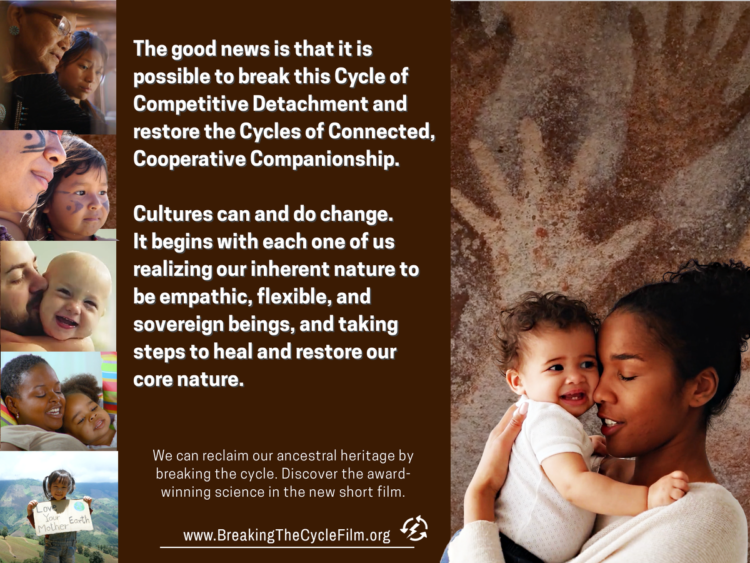The Reason For The Absence Of The Feminine Principle In The Western World
Kathy Jones, Priestess of Avalon, UK, presents with Kindred World’s president, Darcia Narvaez, author of this post, at the Maternal Gift Economy Salon on October 23, 2021. Listen to their presentations, and the discussions, below. Join the Maternal Gift Economy Salons here. Learn more about the MotherWorld movement in the United Kingdom here.
Editor’s Note: At the October 2021 Maternal Gift Economy Salon, Darcia Narvaez, Kindred World’s president and Evolved Nest founder, presented the science behind our Cycle of Competitive Detachment and the role of our lack of humility in Western Dominator Culture; and Kathy Jones, a Priestess of Avalon in the United Kingdom, presented our loss of relationship to and return to the Sacred Feminine. It wasn’t difficult to discern that both the scientist and the priestess were pointing us toward the same path: one of accepting our roles and responsibilities as stewards of life, and mothers/caregivers to all children. Where is the bridge between these two worldviews? I asked Darcia after the call. Below is her reply
The reason for the absence of feminine principle in the western world results from the emphasis on the conscious ego aspect of the self. Ego consciousness is associated with left brain hemisphere functioning, a small aspect of human functioning. Most of how we behave is guided by systems that are not conscious.

With appropriate supportive care in early life (evolved nest provision, needed because the infant is highly immature), innate brain structures (e.g., vagus nerve) are ready to be shaped by experience. Experience molds the non-verbal right hemisphere (RH) which is scheduled to grow more rapidly than the left in the early years. When supported for healthy development, these brain structures are associated with capacities for empathy (emotional and cognitive), social communication and coordination, self-control, and holistic awareness. When early life experience is inconsistent with the evolved nest, these capacities may remain underdeveloped. Various systems can become dysregulated. From early undercare and toxic stress, the sympathetic nervous system will be enhanced instead, leading to easy triggering of the stress response (flight, fight, freeze, faint) throughout life. When this system is activated, the flexible responsiveness of social and emotional intelligence will be impaired. However, lack of supportive care leads to the underdevelopment of these intelligences, due to brain biochemistry hostile to their development and lack of immersed social experiences that foster their development (e.g., screen time instead of face-to-face play).
The missing feminine side of our personalities comes from undercare in early life—coercive care that was unresponsive to our bids for companionship. With undercare, capacities for empathy are impaired because the baby is not treated with empathy and feels distress and despair instead. Social communication skills are underdeveloped when a baby is not immersed in a community of responsive caregivers. Babies don’t grow what is not encouraged. Instead, in this case children are encouraged to suppress feelings, intuitions, interests, to fit into an adult world not focused on meeting their needs.
So there is a gap in our personalities where our intuitive hearts should be guiding us. We are guided instead by our survival-oriented gut and our schooled mind (conscious ego mind). We experience confusion where there should be certainty about our place in the world as a beloved member of the community with a spirit tuned into the greater cosmos.
In effect, poor early care undermines the “feminine” side of the self, capacities for presence, connection to others, and mutual understanding—the heartmindedness that most societies consider central to being human. Our species’ gift economy, starting with mothers’ unilateral giving, provides the evolved nest. The loving presence of motherers (nurturers) promotes the basic feelings of being safe, beautiful and cherished.
Boys are more thwarted by undercare because they mature more slowly and have less built-in resilience than girls. With arrested development, their psychosocial neurobiology will be incomplete or misguided. They are more likely to be dysregulated, relationally inflexible, holistically unaware, and caught in survival system orientations of dominance hierarchies.
Unfortunately, culture emerges from early life experiences, practical life experiences, and the stories we and our culture use to explain behavior. Undercare fosters a sense of scarcity and anxiety, limiting thinking and being in the individual. The culture of undercared for individuals will be oriented to competition for limited resources and winning; outsiders will be blamed for any distress. The “feminine” capacities for empathic connection will be ridiculed as weakness rather than understood as the life force for growing our full humanity.


